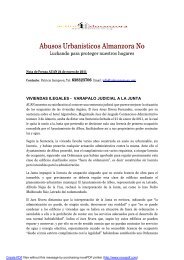European Property Rights and Wrongs - Diana Wallis MEP
European Property Rights and Wrongs - Diana Wallis MEP
European Property Rights and Wrongs - Diana Wallis MEP
Create successful ePaper yourself
Turn your PDF publications into a flip-book with our unique Google optimized e-Paper software.
How conflicts of laws<br />
can affect immovable property<br />
Mr Richard Frimston of the Society of Estates Practitioners (STEP) considers how<br />
conflicts of laws can affect immovable property within the EU:<br />
Conflicts of laws are those rules chosen by a state for the decision of cases which<br />
have a foreign complexion. However in the same way that internal law varies from<br />
one state to another, the conflict of law rules also vary. There are many circumstances<br />
in which states do not agree as to which state’s laws apply. This causes<br />
uncertainty <strong>and</strong> the inability to enforce laws across borders.<br />
Amongst many other things, the 1992 Maastricht Treaty created the <strong>European</strong><br />
Union, the third pillar of which concerned cooperation in the field of justice <strong>and</strong><br />
home affairs so as to offer <strong>European</strong> citizens protections in the areas of freedom,<br />
security <strong>and</strong> justice.<br />
Since then, the EU institutions have been working through a number of programmes<br />
with a view to harmonising conflicts of laws rules between member<br />
states in different areas of law.<br />
EU Legislative Vehicles<br />
To achieve its aim, EU institutions can adopt regulations, directives, recommendations<br />
or opinions. Regulations are the most powerful being binding <strong>and</strong> directly<br />
applicable across the EU whereas directives are binding on each member state<br />
but leave it up to the national authorities as to how they should be implemented.<br />
In harmonising conflicts of laws rules, the EU has primarily used various<br />
Regulations, <strong>and</strong> because of their power much care has been required in their<br />
preparation <strong>and</strong> those in existence have been subject to review.<br />
Real <strong>Property</strong> in the EU<br />
Although cross-border real estate transactions are increasingly common, real estate<br />
law is one of the branches that has not been directly the subject of any EU<br />
Regulations <strong>and</strong> has remained essentially national. Only Directive No. 47/47 dealing<br />
with time share rights directly applies.<br />
Some legislation does already affect real estate, although obliquely:<br />
62<br />
Linking up national L<strong>and</strong> Law systems



